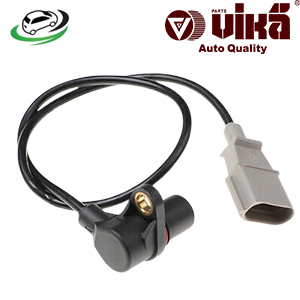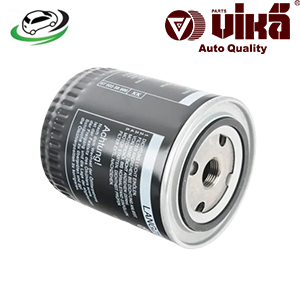-27%
Get Oil Filter Audi B5 A4/ B5 S4/ B6 A4/ C4 A6/ C5 Allroad / VW Passat B5 V6 30v 078115561J
The oil filter is an essential component of an internal combustion engine’s lubrication system. Its primary function is to remove contaminants from engine oil, ensuring that the oil circulating through the engine remains clean and effective at lubricating and cooling engine components. This filtration process is crucial for maintaining engine performance, efficiency, and longevity. In this detailed overview, we’ll explore the oil filter’s function, design, benefits, common issues, and maintenance.
1. Function and Role of the Oil Filter
The oil filter’s primary role is to clean the engine oil by trapping and holding contaminants that accumulate during engine operation. These contaminants can include dirt, metal particles, carbon residue, and other debris that can cause wear and tear on engine components if left unchecked.
As the engine runs, oil circulates through it, lubricating moving parts such as the crankshaft, camshaft, pistons, and valves. This oil also helps to cool the engine and reduce friction, but as it does so, it picks up contaminants. The oil filter intercepts these contaminants before they can circulate back through the engine, thus preventing damage and ensuring that the engine continues to run smoothly.
2. Types of Oil Filters
Oil filters come in various designs and types, each suited to specific applications and engine types. The most common types include:
- Full-Flow Oil Filters: Also known as primary oil filters, these are the most common type of oil filter used in vehicles. Full-flow filters are designed to filter all the oil that circulates through the engine, ensuring that the oil is cleaned before it reaches critical engine components. They use a pleated paper or synthetic filter media to trap contaminants while allowing the oil to flow freely.
- Secondary (Bypass) Oil Filters: Unlike full-flow filters, bypass filters only filter a small portion of the oil at any given time. They are typically used in addition to full-flow filters to provide finer filtration, capturing smaller particles that may not be trapped by the primary filter. Bypass filters are often found in high-performance or heavy-duty engines where extra filtration is needed.
- Cartridge Oil Filters: These filters consist of a replaceable filter element housed within a permanent casing. When it’s time for an oil change, only the filter element is replaced, reducing waste and cost. Cartridge filters are becoming increasingly popular in modern vehicles due to their environmental benefits.
- Spin-On Oil Filters: These filters are the most commonly used type and feature a metal canister that contains the filter element. The entire filter is replaced during an oil change. Spin-on filters are known for their ease of use, as they simply screw on and off the engine.
- Magnetic Oil Filters: Some oil filters incorporate magnets or magnetic elements that help capture and hold metal particles suspended in the oil. These filters are particularly useful in engines where metal debris is a concern, such as high-performance or older engines.
3. Design and Construction of Oil Filters
Oil filters are designed to balance filtration efficiency with oil flow rate, ensuring that the engine receives a steady supply of clean oil without significant pressure drop. The main components of an oil filter include:
- Filter Media: The core of the oil filter is the filter media, which traps contaminants as the oil passes through it. The media can be made from various materials, including cellulose (paper), synthetic fibers, or a combination of both. Synthetic filter media generally offer better filtration efficiency and longer service life than cellulose media.
- Housing: The housing, or canister, of the oil filter contains the filter media and other internal components. It is typically made of metal for durability, although some cartridge filters use plastic housings.
- Anti-Drainback Valve: This valve is found in most oil filters and prevents oil from draining out of the filter when the engine is turned off. This ensures that oil is available immediately upon engine startup, reducing wear during the critical first few seconds of operation.
- Pressure Relief Valve: Also known as a bypass valve, this component allows oil to bypass the filter if the filter becomes clogged or if the oil is too thick (e.g., during cold starts). This ensures that the engine continues to receive oil even if the filter is compromised, although the oil may not be fully filtered.
- End Caps: The end caps of the filter media hold the pleats together and seal the filter element within the housing. They are typically made of metal or a heavy-duty plastic.
- Base Plate: The base plate, or gasket plate, is the part of the filter that screws onto the engine. It has holes that allow oil to enter the filter and a central threaded hole for attachment. A rubber gasket around the base plate ensures a tight seal to prevent leaks.
4. Benefits of Using an Oil Filter
- Engine Protection: The primary benefit of the oil filter is the protection it provides to the engine. By removing contaminants from the oil, the filter prevents abrasive particles from causing wear and tear on engine components. This reduces the risk of engine damage and helps maintain optimal performance.
- Extended Engine Life: Clean oil is essential for reducing friction and wear in the engine. By keeping the oil free from contaminants, the oil filter helps extend the life of the engine, potentially allowing it to run for hundreds of thousands of miles with proper maintenance.
- Improved Engine Performance: An engine that is well-lubricated with clean oil runs more efficiently, producing more power and consuming less fuel. The oil filter contributes to this by ensuring that the oil is free from debris that could impede its ability to lubricate and cool the engine.
- Reduced Emissions: A clean and well-maintained engine produces fewer emissions. By ensuring that the oil remains uncontaminated, the oil filter helps the engine operate more cleanly, contributing to lower exhaust emissions and helping the vehicle comply with environmental regulations.
5. Common Issues and Failures
Despite its simple design, the oil filter can experience several issues that can affect its performance and the overall health of the engine:
- Clogging: Over time, the filter media can become clogged with contaminants, reducing the oil flow rate and potentially causing the pressure relief valve to open. This allows unfiltered oil to circulate through the engine, which can lead to increased wear and damage.
- Leaks: A damaged or improperly installed oil filter can leak oil, leading to low oil levels in the engine. This can cause insufficient lubrication and potentially lead to serious engine damage if not addressed promptly.
- Bypass Valve Failure: If the pressure relief valve fails to operate correctly, it can either allow unfiltered oil to bypass the filter prematurely or restrict oil flow entirely, leading to oil starvation and engine damage.
- Gasket Issues: The gasket on the oil filter can degrade over time or become damaged during installation, leading to oil leaks. Ensuring that the gasket is in good condition and properly installed is crucial for preventing leaks.
6. Maintenance and Replacement
Regular maintenance of the oil filter is essential to ensure that the engine continues to run smoothly and efficiently:
- Regular Oil Changes: The oil filter should be replaced at every oil change, typically every 3,000 to 7,500 miles, depending on the vehicle and driving conditions. Replacing the filter ensures that it doesn’t become clogged and that the engine receives clean oil.
- Choosing the Right Filter: It’s important to use the correct oil filter for your vehicle. Using a filter that is not designed for your engine can lead to improper oil flow, reduced filtration efficiency, and potential engine damage. Always refer to the vehicle’s owner’s manual for the recommended filter specifications.
- Inspecting the Filter: During oil changes, inspect the old filter for signs of excessive wear, clogging, or damage. This can provide insight into the condition of the engine and the oil, helping to identify potential issues before they become serious problems.
- Proper Installation: When installing a new oil filter, ensure that the gasket is properly lubricated with a thin layer of oil to create a good seal. The filter should be hand-tightened according to the manufacturer’s instructions to prevent leaks.
7. Importance in Modern Engines
In modern engines, the oil filter’s role is more critical than ever. As engines become more efficient, they operate under higher pressures and temperatures, placing greater demands on the lubrication system. High-performance engines, in particular, require advanced oil filters capable of handling synthetic oils and finer filtration requirements.
In addition, modern engines often use smaller oil passages and tighter tolerances, making them more susceptible to damage from contaminants. The oil filter’s ability to keep the oil clean is crucial for preventing premature wear and ensuring that the engine continues to operate at peak efficiency.
Follow us on Facebook for more parts.





